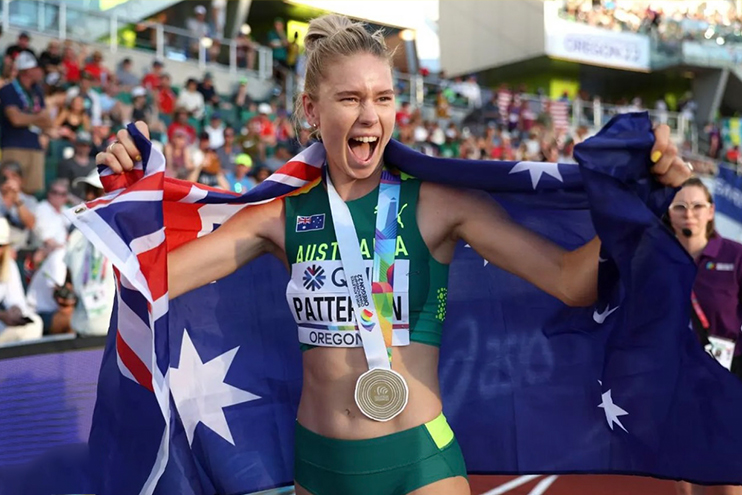
John Salvado / AAP News
A formidable force of female field athletes will spearhead the Australian athletics challenge at the Birmingham Commonwealth Games.
Australia finished the world championships in a best-ever position of sixth on the medals table.
The host nation dominated the 10-day meet with a record 33 medals, including 13 golds, Ethiopia was second with four golds and Australia was among only five other nations to win two events.
And in a sign of the green-and-gold squad’s improved depth, the 11 top-eight finishes were the best this century at a major championship.
All three of the medals – golds to Kelsey-Lee Barber in the javelin and Eleanor Patterson in the high jump, and bronze to pole vaulter Nina Kennedy – came from women in the field.
Three of the other top-eights were from the same source.
It’s no secret that women have done most of the heavy lifting for Australian athletics ever since they were allowed to compete in a variety of events on the international stage in the post-World War II era.
But the power shift from the track to the field is a more recent phenomenon.
“I said coming into Eugene that we’d had a fantastic Tokyo Olympics and we just wanted to repeat that here,” said Athletics Australia high-performance boss Andrew Faichney.
“The team overall has done a fantastic job and it’s really been led by our female field event athletes.
“Winning two golds – we haven’t done that since the London Olympics 10 years ago.”
As is always the case in a Commonwealth Games track and field competition, the standard will vary wildly from event to event.
At the top end is the women’s 100m hurdles, where five of the eight world championships finalists – led by new world record holder Tobi Amusan from Nigeria – should be on the start-line in Birmingham.
Michelle Jenneke had the best performance of her career in Eugene, but will likely have to again go close to her new PB of 12.66 seconds just to make it through to the final.
Many of the other track events will be strong at the top end, along with the marathons, with Australia’s best long-distance runners prioritising the Commonwealth Games over the world titles.
But the walk fields are very thin, while the throws often lack depth at the Commonwealth level.
“There are going to be some great races and some terrific other events in Birmingham,” said Faichney.
“What we’ve shown is that we’re right in amongst it in most of the events.”
Having the two big meets so close together was always going to prove a challenge on the fitness front and so it has proved.
Hurdler Liz Clay broke her foot in Eugene, while sprinter Riley Day and 800m runner Joseph Deng (Achilles tendon) have run out of time to prove their fitness.
Tokyo Olympics bronze medallist Ash Moloney (knee) is also an unlikely starter in the decathlon.
Faichney is hopeful at least some of the absentees can be replaced by other Australian athletes, although the process is a convoluted one.
The first athletics events in Birmingham are the marathons on Saturday.
Australian top-eight finishes in Eugene
First – Eleanor Patterson (women’s high jump)
First – Kelsey-Lee Barber (women’s javelin)
Third – Nina Kennedy (women’s pole vault)
Fourth – Jemima Montag (women’s 20km walk)
Fifth- Nicola Olyslagers (women’s high jump)
Fifth – Brooke Buschkuehl (women’s long jump)
Fifth – Mackenzie Little (women’s javelin)
Sixth – Matthew Denny (men’s discus)
Seventh – Jessica Hull (women’s 1500m)
Seventh – Peter Bol (men’s 800m)
Eighth – Cedric Dubler (decathlon)
